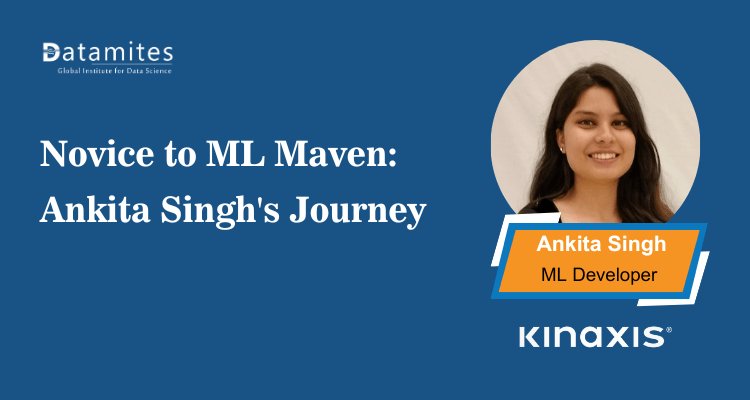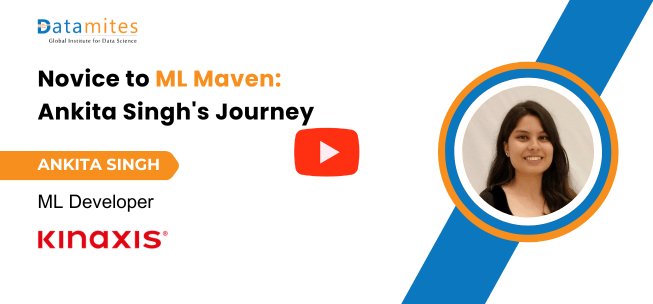From Math Graduate to Machine Learning Developer: Ankita’s Inspiring Journey into AI
Ankita Singh’s journey from a postgraduate in Mathematics to a Machine Learning Developer is a powerful example of determination and smart upskilling.

From studying numbers on paper to training machines to think—Ankita’s journey is anything but ordinary. With no formal IT background, she defied the odds and transitioned from a math graduate to a Machine Learning Developer. In this inspiring story, discover how she overcame self-doubt, mastered in-demand AI skills, and carved her path into one of tech’s most exciting fields. Whether you’re just starting out or considering a career switch, Ankita’s story proves that with the right mindset and guidance, anything is possible.
An Inspiring ML Developer Journey: Q&A with Ankita Singh
In this Q&A, she shares how she navigated career transitions, resume challenges, and key skills to land her role as an ML Developer.
Q1: Can you briefly introduce yourself and your academic background?
Yes, sure! I'm a postgraduate in Mathematics from the Central University of Karnataka. Interestingly, I come from a non-IT background with no formal coding education aside from a bit of C++ I studied in my 12th grade.
Q2: What sparked your interest in artificial intelligence and machine learning?
While in college, I attended a workshop related to AI, which caught my attention and sparked my interest in this field. I began exploring the domain more deeply. A friend recommended DataMites, and I decided to enroll there in November 2023 to upskill myself.
Q3: What was your learning experience like at DataMites?
My learning experience was quite enriching. Although the course is primarily structured for Data Scientist roles, it laid a solid foundation for my career. I realized that for a Machine Learning Developer role, you need additional technical depth, especially in model development and deployment. But DataMites helped bridge a lot of gaps for me, especially through its well-structured curriculum and supportive trainers.
Q4: Did you attend classes online or offline, and from which location?
I was an online student, attending sessions from Chennai. The online mode worked very well for me and gave me the flexibility to manage my studies effectively.
Q5: Which modules or topics did you enjoy the most during the course?
I enjoyed Machine Learning and Deep Learning the most. These areas connect strongly with mathematics, which is my favorite subject. I also had a few like-minded friends in the batch, and we often collaborated to solve complex problems, which made learning more engaging.
Q6: How did you prepare for interviews, especially in terms of communication?
I focused not just on understanding the concepts, but also on communicating them clearly. I used to explain technical concepts to my friends, and if I made mistakes, they would correct me. This helped me prepare better for interviews where how you present your answers matters just as much as what you say.
Q7: What advice would you give to candidates preparing for technical interviews?
Practice explaining answers aloud. It’s not just about knowing the answer, but delivering it confidently and clearly to the interviewer. Talk to your friends or family members and get feedback. Think from the interviewer’s perspective: are they able to understand you?
Q8: What type of interview rounds did you go through for your current job?
There were six interview rounds. The first one was a coding round, where I had to write five programs on paper. It was a bit tough because we’re used to Jupyter Notebooks where errors are easy to fix. But I had practiced enough to get through it.
Q9: What were the technical topics asked in your coding and ML rounds?
The first round focused on:
- Advanced Python (especially OOPs)
- Advanced SQL
Later rounds were more application-based questions in machine learning. For example, one interviewer gave me a real-world scenario in data preprocessing and asked how I would handle it.
Q10: Did your internship at DataMites help in your preparation?
Absolutely. The internship at DataMites gave me hands-on experience which helped me understand real-world challenges in machine learning. You can’t just rely on theory; practical application is crucial.
Q11: Which skills or tools that you learned during your AI course have been most useful in your job?
Although I'm currently working in a different capacity, I’d say Python and Machine Learning concepts were the most valuable during interviews. Most of the job roles don't use all the concepts you learn—but these two helped me clear technical rounds.
Q12: Are all the skills learned in an AI course directly applicable to industry roles?
Honestly, not everything. In most jobs, you'll end up using only a subset of the tools and concepts taught in your course. But for cracking interviews, especially for ML or data science roles, having a good grasp of Python and ML is non-negotiable.
Q13: Any advice for aspiring ML developers from non-technical backgrounds?
Yes, don't let your background hold you back. Stay curious, practice regularly, and work on hands-on projects. Leverage internships and collaborative learning. Most importantly, focus not just on understanding concepts but on being able to confidently explain them in interviews.
Refer these below articles:
- Reeta’s Inspiring Journey to Becoming a Data Annotator
- Innovation Through Intelligence: Rahul’s AI Career Unfolded
- AI Engineer Bhavya Ranjan Shares His Generative AI Journey
Key Takeaways from Ankita Singh’s ML Developer Journey
Here are the key takeaways from her journey, packed with practical tips and real-world lessons.
- Non-IT Background Doesn’t Limit Opportunities: Ankita holds a postgraduate degree in Mathematics and had minimal coding exposure before entering AI/ML.
- Inspiration Sparked Through Exposure: A college AI workshop ignited her interest, leading her to explore further and eventually join DataMites in November 2023.
- Structured Learning is Crucial: The DataMites course, although designed for data science roles, provided a strong foundational base and exposure to practical ML tools.
- Online Learning Can Be Equally Effective: Attending classes online from Chennai gave her the flexibility to learn and prepare effectively.
- Mathematics Strength Boosted ML & DL Understanding: Her love for math made Machine Learning and Deep Learning her favorite modules, enhancing her grasp of complex algorithms.
Read these below articles:
- The Current Demand for Artificial Intelligence in Dispur
- Is Artificial Intelligence Still in High Demand in Dhanbad?
- Is the Demand for Artificial Intelligence Still High in Tirupur?
Ankita’s journey from a mathematics graduate to a Machine Learning Developer shows that with the right mindset, guidance, and resources, career transitions are very much possible. If you’re planning to pursue an artificial intelligence course and wondering whether it’s the right move, take inspiration from Ankita's success and start your journey today.
Artificial Intelligence (AI) is reshaping Coimbatore’s growth, boosting various sectors and positioning the city as a rising tech hub in South India. With the presence of leading artificial intelligence institutes in coimbatore, specialized AI courses are equipping students with the skills needed for the digital era. As the city advances toward smart city status, AI is driving innovation in transportation, waste management, and urban planning, making it a core part of Coimbatore’s future development.
DataMites has firmly established itself as one of the leading artificial intelligence institute in ahmedabad, catering to learners aiming for careers in AI, Machine Learning, and Data Science. Alongside practical exposure, students receive globally recognized certifications from IABAC and NASSCOM FutureSkills, bolstered by resume guidance, interview preparation, and job placement support.

